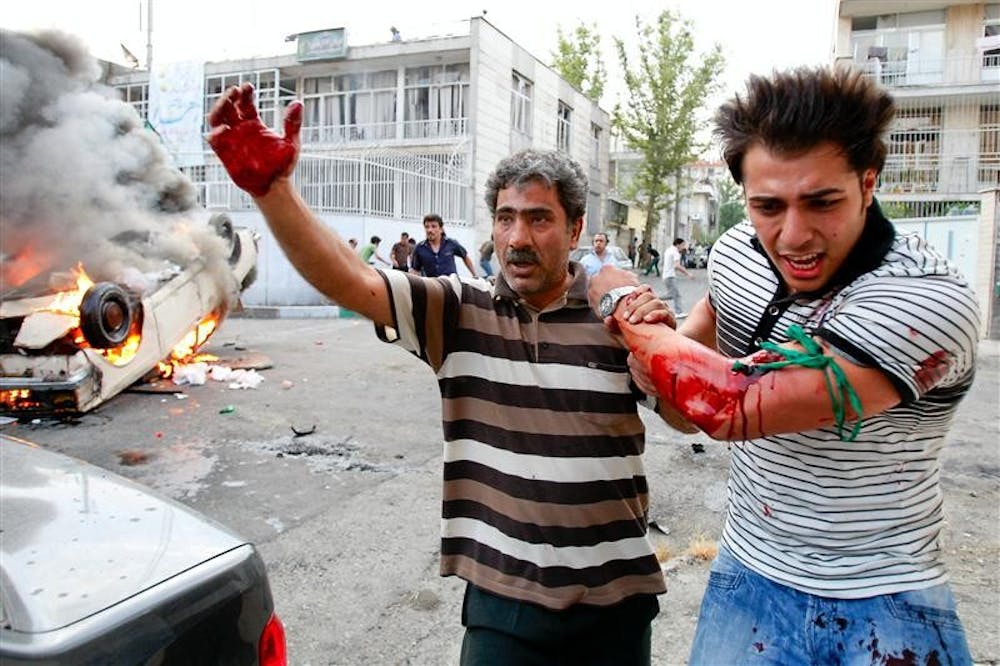About two weeks after Iran’s disputed presidential election, protests continue despite government crackdown.
“Please come to Baharestan Sq. in Tehran tomorrow at 4pm,” wrote Mir-Hossein Mousavi, former Iran prime minister and main opposition leader, on his Twitter page Tuesday.
Protesting began after the June 12 announcement that President Mahmoud Ahmadinejad was the winner of the ongoing presidential elections. The announcement, which stated he had gained more than 60 percent of the vote, led to allegations of voting fraud.
On June 16, after examining opposition complaints about voting irregularities, the Guardian Council, which oversees elections and legislation in Iran, said Iranian law prevented it from voiding the last vote and having a new one and that it was prepared to order a partial recount.
On Tuesday, the Guardian Council said there was not enough proof of fraud to overturn the election, according to state news reports.
Democratic process gone awry
“Iran’s presidential elections began as a matter of national sovereignty, and so did disputes over elections results,” said Jamsheed Choksy, IU professor of Iranian studies in the department of Central Eurasian studies. “But when Iran’s government failed to investigate and resolve election discrepancies in accordance with its law and constitution, and after the government in Tehran and Qom resorted to threats and violence, that government lost its legitimacy.”
Choksy said because there were presidential debates and other actions, Iranian citizens had a different expectation with the voting and election process.
“At first, there was a very open electoral process,” Choksy said. “It led to the expectation that results would be transparent, but they weren’t.”
As the opposition continued to protest, the Iranian government cracked down on protesters. By June 17, Iran had also cracked down on outside journalists, leaving popular social networking sites such as Twitter as the only means of communication.
“It’s a real possibility that if we did not have instant communication means that Iran would be cut off from the world,” Choksy added. “Instant communication is really important to maintain freedom.”
However, Choksy explained that all communication must go through a communication network in Iran, and the Iranian government has been able to use some of this information to its advantage to track protests.
“The government is protecting all communications that tell time and other information about planned protests,” Choksy said.
Choksy said the government has been able to assemble groups of military personnel to break up protests before they happen, and he said the government has been succeeding because the number of protests have been declining.
IU enrolls Iranian students
Even though Iran is a country far from the United States, Choksy said students have many reasons to care, citing friends, family, oil and freedom as just a few.
“Freedom is something that impacts all of us,” Choksy said. “And it extends beyond U.S. boundaries.”
IU’s connection with Iran hits a little closer to home. IU-Purdue University Indianapolis has, since fall 2007, offered a dual engineering degree program with the University of Tehran. Iranian students split their time between the two universities and receive degrees from both.
There are now 36 Iranian students at IUPUI under the program, said Sara Allaei, assistant dean and director for international services. After successfully completing the first half of the program in Tehran, demonstrating English proficiency and documenting financial ability as required by the student visa process, the students are admitted to IUPUI as transfer students.
But there is no U.S. Embassy in Iran. Because of this, students must travel outside the United States to obtain their visas. As Iranian nationals, the students face a security clearance delay that typically takes at least three to four weeks, and sometimes quite a bit longer, before their visas can be issued, Allaei said.
“The next group of about 15 students is scheduled for visa interviews in Dubai on July 1 and 2,” Allaei said. “We have not heard any reports from the students that they anticipate difficulties planning for travel.”
‘Information is power’
As a student who came to the United States from Tehran to attend an American college, IU senior Maryam Akbari said she feels a little disconnected from what’s going on in Iran but said the Iranian people are trying to make important steps during this conflict.
“First, they want a new election in which international observers are present,” Akbari said. “Second, they want the government to stop killing innocent people.”
Akbari said people in Iran have limited access to Twitter, and she said she believes the reason why the Iranian government is trying to keep information within the country is simple.
“Information is power,” Akbari said. “They may be afraid that if people in Iran learn about how the rest of the Iranians in and around the world are supporting them, it would be harder for government to control the people.”
Akbari added that Iranian people want people across the world to know that Ahmadinejad does not represent them. As for others in the United States who wish to get involved, Akbari said there are many protests in which they can participate. But the best way would be to educate other people about the situation, she said.
Though Akbari said she agrees that the end result in Iran is unclear, there is one sure goal.
“The most important thing is to move toward a better society,” Akbari said. “Even if it is only few steps.”
IU, Iran connected through crisis

Get stories like this in your inbox
Subscribe





